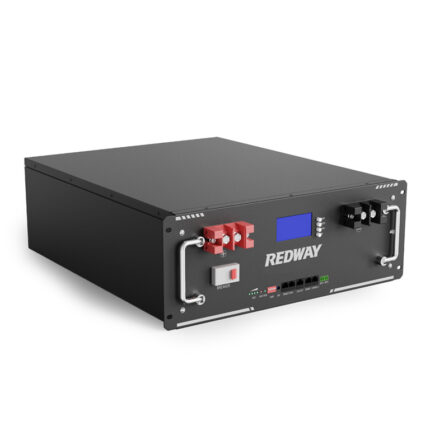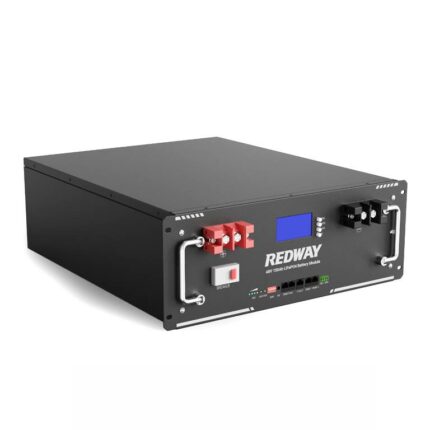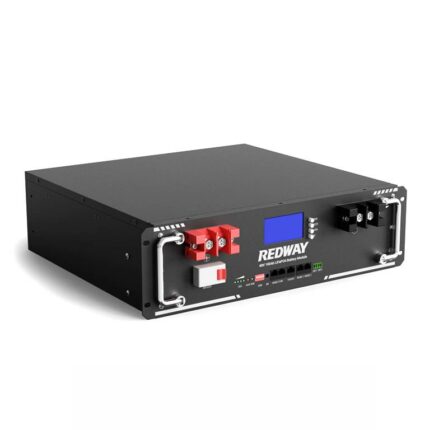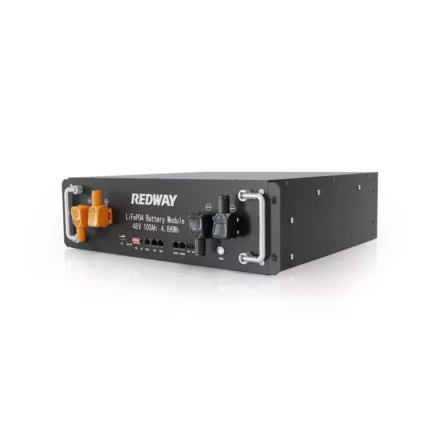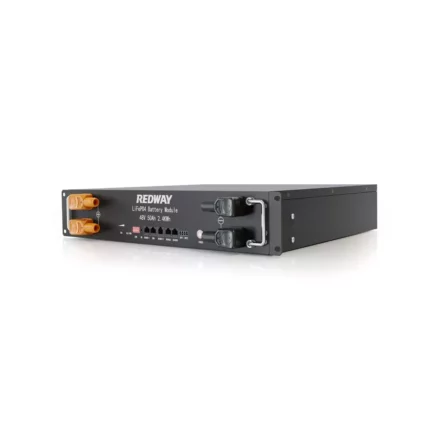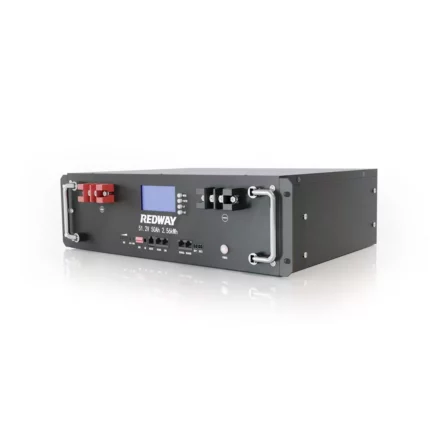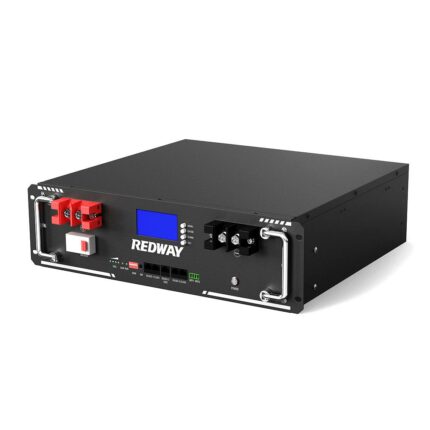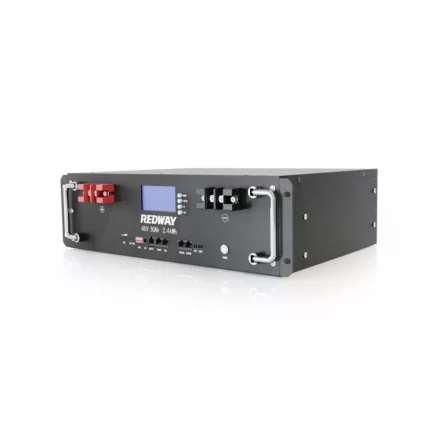Server Rack Battery
- Forklift Lithium Battery
- Golf Cart Battery
- Server Rack Battery
- Telecom Battery
- 12V LiFePO4 Batteries
- 24V LiFePO4 Batteries
- 36V LiFePO4 Batteries
- 48V LiFePO4 Batteries
- 60V LiFePO4 Batteries
- 72V LiFePO4 Batteries
- 96V LiFePO4 Batteries
- E-Bike Battery
- All-in-One Home ESS
- Power Storage Wall
- High Voltage Server Rack Battery / System
- Power Bank
- 21700 cell
- Hot
Redway Lithium Battery Module is a LiFePO4 battery unit with an integrated Battery Management System (BMS), designed for seamless compatibility with external inverters or chargers. This versatile module serves as an effective energy storage solution for both off-grid and grid-tied applications, enabling self-consumption. Moreover, the system allows for effortless expansion with additional battery modules at any time.
Showing all 14 results
FAQs▾
Why Choose Redway for Lithium Server Rack Batteries?
Redway is the top choice for lithium server rack batteries. Their batteries offer superior efficiency, longer lifespan, and reduced maintenance needs compared to traditional lead-acid batteries. With a lighter and smaller design, Redway's batteries maximize space and provide faster recharge times. Choose Redway for energy-efficient and reliable lithium server rack batteries that can handle high current loads and meet your specific power requirements.
What is the Lifespan of a Lithium Server Rack Battery?
The lifespan of a lithium server rack battery can range from 8 to 14 years under normal operating conditions. A 48V (51.2V) 100Ah LiFePO4 battery can endure approximately 3,000-5,000 full discharge cycles. However, the actual lifespan depends on factors like depth of discharge, operating temperature, charge/discharge rate, frequency of cycling, and preventive maintenance. To maximize lifespan, avoid deep discharges, maintain a cool temperature, use smart charging techniques, ensure proper ventilation, conduct regular check-ups, and follow the manufacturer's recommendations. Trust lithium server rack batteries for reliable power supply over a decade.
How to Understand UL 1642 for Lithium Server Rack Batteries?
UL 1642 is a certification standard for lithium server rack batteries. It sets requirements for user-replaceable lithium-ion batteries, ensuring their safety and performance. The standard limits metallic lithium content and conducts rigorous testing for electrical performance, thermal stability, and protection against hazards. UL 1642 certification assures compliance with industry-accepted safety standards, providing peace of mind to consumers. Trust lithium server rack batteries with UL 1642 certification for reliable and safe power solutions in server rack applications.
How Do 14500 Batteries Compare with AA in Server Racks?
When comparing 14500 batteries and AA batteries in server racks, there are notable differences. 14500 batteries have a higher voltage and capacity, making them suitable for applications that require more power and longer usage time. Additionally, most 14500 batteries are rechargeable, providing cost savings in the long run. While AA batteries are available in both disposable and rechargeable options, they may have a lower voltage and capacity. Consider your specific power requirements and budget when choosing between 14500 batteries and AA batteries for server racks.
How to Revitalize Golf Carts with Lithium Server Rack Batteries?
Revitalize your golf cart with lithium server rack batteries for enhanced performance and longevity. Upgrade to lithium batteries for benefits like longevity, weight savings, faster charging, consistent power output, and minimal maintenance. Choose the right voltage based on manufacturer specifications and performance requirements. Consider factors like reputation, quality, warranty, compatibility, and performance specifications when selecting a lithium battery brand. Explore options like ZPRO Lithium and follow the installation instructions for a seamless upgrade experience. Elevate your golf cart experience with lithium server rack batteries.
What is the IEC 62133 Safety Standard for Lithium Server Rack Batteries?
The IEC 62133 safety standard is an international standard specifically designed for rechargeable lithium-ion batteries. It sets specific safety requirements to reduce the risk of accidents and hazards associated with these batteries. The standard covers various aspects of battery safety, including electrical, mechanical, and chemical safety. Compliance with the IEC 62133 standard ensures the safe and reliable use of lithium server rack batteries in a wide range of applications. Manufacturers must adhere to stringent manufacturing, testing, and transportation requirements to meet the safety standards set by IEC 62133.
How Do IEC 62133 and UL2054 Standards Differ for Lithium Server Rack Batteries?
The IEC 62133 and UL2054 standards differ in their testing focus for lithium server rack batteries. UL2054 evaluates exposure concerns and the battery pack's ability to withstand various environmental conditions. In contrast, IEC 62133 focuses on identifying fire or explosion hazards associated with batteries and tests the battery's ability to withstand abuse conditions. Both standards require the same number of samples for testing. Understanding these differences is crucial for ensuring battery safety and compliance with the appropriate standards.
What are the Best Server Rack Battery Backup Solutions?
Choosing the best server rack battery backup solution requires considering factors such as power capacity, efficiency, reliability, battery runtime, and ease of installation. The CyberPower PR3000N is a top-ranked battery backup with a score of 9.7. It offers advanced features like automatic voltage regulation, surge protection, and battery backup. With its excellent performance, ease of setup, reasonable price, and top-notch customer support, the CyberPower PR3000N is highly recommended for reliable power protection in server racks. Explore the 7 best rack mount battery backups to find the right solution for your needs.
How to Extend Server Rack Battery Life and Maintenance Tips?
To extend the life of server rack batteries, follow these maintenance tips. Keep discharge levels between 50-80% and maintain an ambient temperature around 77°F or lower. Optimize battery performance with smart charging techniques like temperature-compensated charging. Ensure proper ventilation and a dust-free environment. Regularly monitor the battery's health and capacity. Adhere to the manufacturer's guidelines for care and maintenance. By implementing these practices, you can significantly enhance the efficiency and lifespan of your server rack batteries, making them a cost-effective and reliable choice for your server infrastructure.
How to Choose the Right Server Rack Battery System?
Choosing the right server rack battery system involves considering factors like battery type, power requirements, capacity, maintenance, environmental impact, and certifications. LiFePO4 batteries are a popular choice due to their long lifespan, safety features, high efficiency, and reliable performance. ELB Energy Group is a reputable manufacturer specializing in server rack batteries, offering a wide range of options. Consult them for expert guidance and reliable solutions. Make an informed decision to ensure your server rack has a dependable and efficient battery system for uninterrupted power supply.
Why Use Server Rack Batteries in Data Centers?
Server rack batteries are crucial in data centers for uninterrupted power supply, data protection, surge protection, smooth transitions, and regulated power. They ensure continuous operation during power outages, preventing downtime and protecting valuable data. With features like controlled server shutdowns, surge protection, and seamless power transitions, server rack batteries provide reliable power and hardware integrity. While they have initial costs, maintenance requirements, limited runtime, environmental considerations, and space constraints, their benefits outweigh these drawbacks. Invest in server rack batteries to ensure the reliability and continuity of your data center or business operations.
What are the Top-Rated Server Rack Batteries for Power Protection?
Looking for the top-rated server rack batteries for power protection? Consider factors like warranty, lifespan, energy capacity, cycle life, safety certifications, and compatibility. The Aolithium blog features a list of the top 5 server rack batteries for 2023, highlighting their key features and benefits. Choose batteries with a long lifespan, high energy capacity, and a robust battery management system (BMS) for optimal power protection. Evaluate warranty, cycle life, and safety certifications for reliability. Find the perfect server rack battery to meet your power protection needs.
What is a server rack battery?
A server rack battery is a backup power solution housed within a rack, typically used to maintain power to servers during outages. These batteries ensure that critical systems remain operational and prevent data loss until power is restored or systems can safely shut down.
What battery does server UPS use?
Server UPS systems typically use lead-acid or lithium-ion batteries. Lead-acid batteries are more common due to cost-effectiveness, while lithium-ion batteries offer longer life, faster charging, and better performance for high-demand server environments.
How long will a 48V 100Ah battery last?
A 48V 100Ah battery provides 4.8 kWh of energy. To estimate runtime, divide the battery capacity (4,800 Wh) by the device's power draw. For example, a 500W load would last approximately 9.6 hours.
Where do you put power in a server rack?
Power in a server rack is typically managed through Power Distribution Units (PDUs) mounted on the sides or rear of the rack. PDUs distribute power to all devices, ensuring organized cable management and consistent power delivery.
Where should power go on the rack?
Power should be routed through PDUs positioned either vertically or horizontally within the server rack. PDUs help manage and distribute power efficiently to all servers and network devices in the rack.
How much power does a full server rack use?
A full server rack typically consumes between 7 to 25 kW, depending on the density of servers, cooling systems, and network equipment installed. High-performance data centers may require even more power for advanced workloads.
How long will a 100Ah battery run a 1000W inverter?
A 100Ah, 12V battery provides 1,200 watt-hours (Wh). Running a 1000W inverter would last about 1.2 hours, assuming 100% efficiency. In reality, with inverter losses, expect a runtime of around 1 hour.
How long will a 100Ah battery run 600W?
A 100Ah, 12V battery provides 1,200 Wh. Running a 600W load would give approximately 2 hours of runtime. In practice, this may vary slightly due to inefficiencies.
How long will a 100Ah battery run a 12V fridge?
A 100Ah, 12V battery can provide 1,200 watt-hours. If the fridge consumes 40 watts on average, the battery could run it for approximately 30 hours, depending on compressor cycles and energy efficiency.
Which UPS is best for servers?
The best UPS for servers typically depends on capacity and features. Brands like APC, Eaton, and CyberPower offer reliable UPS systems with sufficient capacity (1-3kVA or higher) and features like automatic voltage regulation, pure sine wave output, and hot-swappable batteries.
What is the difference between UPS battery and inverter battery?
A UPS battery provides immediate backup power during outages to prevent downtime, while an inverter battery supplies power with a slight delay. UPS batteries are designed for short-duration, high-power output, whereas inverter batteries handle longer, sustained loads.
Is UPS basically a battery?
A UPS is more than just a battery. It is a system that includes batteries, inverters, and power conditioning equipment to provide immediate backup power and protect devices from voltage spikes, surges, and brownouts.
Why use a server rack?
A server rack organizes and secures multiple servers, network devices, and power systems in a centralized location. It optimizes space, enhances airflow for cooling, and simplifies cable management and maintenance in IT environments.
What is a rack server?
A rack server is a computer designed to fit within a standard server rack. These servers are compact, vertically stackable, and can house powerful processors, storage, and networking in a slim, space-efficient design.
How to connect server rack batteries in parallel?
To connect server rack batteries in parallel, connect all positive terminals together and all negative terminals together. This increases total capacity while maintaining the same voltage, ensuring longer backup power duration for the server system.
Know more:
Why Server Rack Batteries are Essential for Modern Data Centers
How to Choose the Right 48V Server Rack Battery for Your Needs
How to Choose the Right Server Rack LiFePO4 Battery



